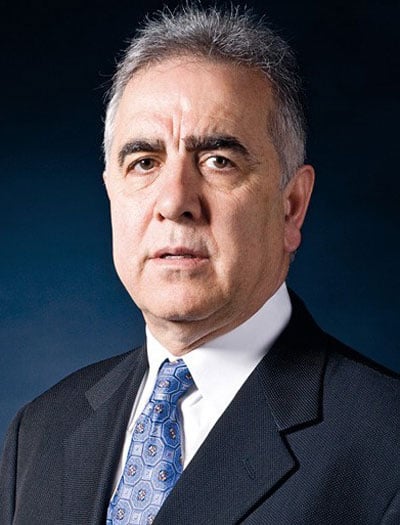By Harut Sassounian
Publisher, The California Courier
Finally, the Armenian President officially declared null and void the infamous Armenia-Turkey Protocols during a meeting of the National Security Council last week. Pres. Sargsyan had made several announcements since 2009, warning that he would remove the Protocols from the Parliament’s agenda unless Turkey ratified them shortly. Pres. Sargsyan’s most recent such warning was made last September during his remarks at the United Nations General Assembly, stating that he would declare the Protocols null and void before the Spring of 2018.
The Protocols were signed by Armenia’s Foreign Minister Eduard Nalbandian and Turkish Foreign Minister Ahmet Davutoglu on October 10, 2009, in Zurich, Switzerland. Also present at the signing ceremony were the Foreign Ministers of Russia, France, Switzerland, U.S. Secretary of State, and high-ranking officials of the European Union.
The lengthy text of the Protocols called for the opening of the borders between Armenia and Turkey, and establishment of diplomatic relations between the two countries. The Protocols also included many other unrelated matters, such as recognizing the existing Armenian-Turkish border, and the establishment of a historic commission to examine problems between the two countries, meaning the Armenian Genocide.
As a result, there was a worldwide outcry against adoption of the Protocols with protests both in Armenia and many Diasporan communities. Shortly before the signing of the Protocols on October 10, 2009, Pres. Sargsyan embarked on a worldwide tour of major Armenian communities in Paris, New York, Los Angeles,
Beirut, and Rostov-on-Don (Russia) ostensibly to listen to their concerns regarding the Protocols. However, it was clear from his remarks at these meetings that he had made up his mind to go ahead with the Protocols, and the intent of the tour was to persuade Diaspora Armenians to give up their objections. During his visits overseas, Pres. Sargsyan was greeted with angry protests and confrontations making his propaganda tour a failure.
During Pres. Sargsyan’s stop in Los Angeles on October 4, 2009, he met with leaders of 60 Armenian organizations with the overwhelming majority criticizing the pending Protocols, while thousands of Armenians demonstrated outside the hotel where the meeting was taking place.
In my remarks at that meeting, I cautioned Pres. Sargsyan that Ilham Aliyev, Azerbaijan’s President, by objecting to the Protocols would block their eventual ratification by Turkey. Ironically, such an outcome would mean that Azerbaijan’s President, not Armenian’s President, would be inadvertently defending Armenia’s interests.
It was clear to many Armenians, both inside and outside of Armenia, that Turkey had no intention of opening its mutual border. The Protocols were a Turkish ploy to pressure Armenia to make territorial concessions to Azerbaijan on Karabagh (Artsakh).
In fact, the signing ceremony in 2009 was delayed by several hours when it became known that Turkey’s Foreign Minister, in his remarks, would link the unrelated subject of the Karabagh conflict to the Protocols. Only the last-minute intervention by Secretary of State Hillary Clinton temporarily resolved the dispute and the two sides proceeded to sign the Protocols.
However, in the years following the signing ceremony, the Turkish leaders made repeated statements that they had no intention to ratify the Protocols unless Armenia made concessions on Karabagh. Indeed, Azerbaijan had vigorously protested the signing of the Protocols and warned Turkey not to proceed with ratification. Azerbaijan intended to pressure Armenia to make territorial concessions on Karabagh by keeping Armenia’s borders with Turkey closed.
Armenia’s leaders had allowed major foreign powers to pressure them into making a decision that was contrary to the Armenian people’s interests. As a small state, it is understandable that Armenia could not act like its larger and more powerful Turkish neighbor which repeatedly flaunts the wishes of the international community. Nevertheless, Armenia’s leaders could at least make an effort to keep foreign intervention to a minimum.
Another lesson Armenia’s leaders should learn from the Protocols’ debacle is that before they embark on initiatives that affect Armenian interests worldwide, they should hold serious consultations to make sure that the majority of Armenians in Armenia and the Diaspora are on board with their decisions. Naturally, internal matters affecting those living within Armenia’s borders are their prerogative, however, issues that affect all Armenians, such as the Armenian Genocide, Armenian territorial demands from Turkey, and the final settlement of the Artsakh conflict are major concerns to all Armenians. Long before signing any documents on these subjects, Armenia’s leadership should ensure that most Armenians agree with them. Otherwise, we shall see the repetition of ugly confrontations in Armenia and the Diaspora with Armenian authorities.
I raise these concerns in response to Pres. Sargsyan’s two statements last week:
1) “When we started the negotiation process, we naturally predicted two outcomes — positive or negative.”
2) “If we get proposals tomorrow, or the next day, we will be ready to discuss them.”
Pres. Sargsyan’s statements indicate that Armenia’s leaders have not recognized their mistaken approach to Armenian-Turkish issues. It is not true that Armenia did not lose anything. Turkey manipulated the Protocols to ensure that no foreign country meddled in the Armenian Genocide issue. In fact, Pres. Obama also exploited the Protocols to refrain from using the term Armenian Genocide in his April 24 statement of 2009 and in the subsequent seven years.
Furthermore, Pres. Sargsyan’s statements indicate that Armenia is apt to make the same mistake again. For years, he had been declaring that Armenia is ready to ratify the Protocols the same day that Turkey ratifies them. Fortunately, Turkey never ratified the Protocols, preventing Armenia from taking an action contrary to its own national interests!




















































